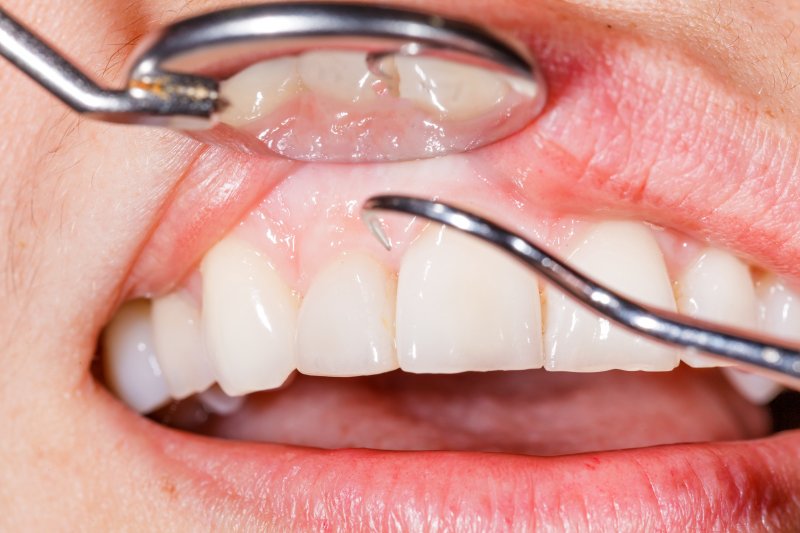
According to the Centers for Disease Control and Prevention (CDC), 47.2% of adults ages 30 years and older and 70.1% of adults 65 years and older have some form of periodontal (gum) disease. It’s also the leading cause of tooth loss in the United States. Gum disease is usually the result of poor oral hygiene, but certain bad habits, medications, and health issues can put you at a higher risk of developing it. Knowing about the dangers associated with this infection can go a long way in preventing it and keeping your smile healthy. Read on to learn about seven common gum disease risk factors.
#1: Weakened Immune System, Diabetes, & Stress
Your immune system is made up of organs, cells, and proteins that work together to protect your body from germs, bacteria, viruses, fungi, and toxins. It also helps protect you from infections. When someone has a weakened immune system due to stress, an autoimmune disorder, diabetes, or another health condition, your gums are at a higher risk of becoming infected.
#2: Certain Medications
Research shows that certain medications can increase one’s risk of gum disease. This includes anticonvulsants, oral contraceptives, calcium channel blockers, steroids, chemotherapy, and antihistamines. Many of these medications can also cause dry mouth, which allows harmful oral bacteria to flourish in your mouth and attack your gums. Drink plenty of water to keep dry mouth at bay.
#3: Crooked Teeth
Crooked or misaligned teeth make it more difficult to clean your teeth properly. They also increase your risk of oral health conditions like cavities and gum disease. Brush your teeth for two minutes every morning and every night with a soft-bristled toothbrush and fluoride toothpaste to combat this. You should also floss at least once per day, preferably before bed.
#4: Obesity & Poor Eating Habits
Obesity impairs the immune system, which puts you at a higher risk of developing gum disease. Additionally, eating and drinking things that are high in sugar, like candy, cookies, and soda, feeds the bacteria that cause cavities. If you’re obese, work with your doctor to come up with a plan to lose weight. Additionally, cut back on your sugar consumption and incorporate dentist-approved foods like fresh fruits and vegetables, lean meat, fish, and low-fat or fat-free dairy into your diet.
#5: Bruxism
Bruxism, which is characterized jaw clenching and teeth grinding, puts extra pressure on your pearly whites and can damage your gum tissue. It can also accelerate the gum recession and deterioration caused by gum disease. If you struggle with bruxism, speak with your dentist about getting a dental guard.
#6: Hormone Changes in Women
When women undergo hormonal changes, especially during pregnancy, this can boost their inflammatory response to plaque and oral bacteria. This can lead to what is often called “pregnancy gingivitis.” If you’re expecting, maintain good oral hygiene to keep you and your baby safe.
#7: Smoking or Chewing Tobacco
Smoking or using other tobacco products significantly lowers your body’s ability to heal and can interfere with the effectiveness of gum disease treatment. If you need help cutting this bad habit out of your life, ask your dentist, doctor, or therapist for resources.
As you can see, there are many gum disease risk factors. By practicing good oral hygiene, eating well, and seeing your dentist every six months, you can prevent infection and keep your smile looking lovely!
About the Practice
If you’re struggling with gum disease, Drs. Carolyn and Walter McGinn and their talented Putnam team can help. They administer a range of exceptional oral health services from their comfortable, inviting office and can provide you with the gum disease treatment you need to get your smile back on track. To make set up an appointment or for more information on gum disease risk factors, call their office at (860) 928-3723 or visit their website.
